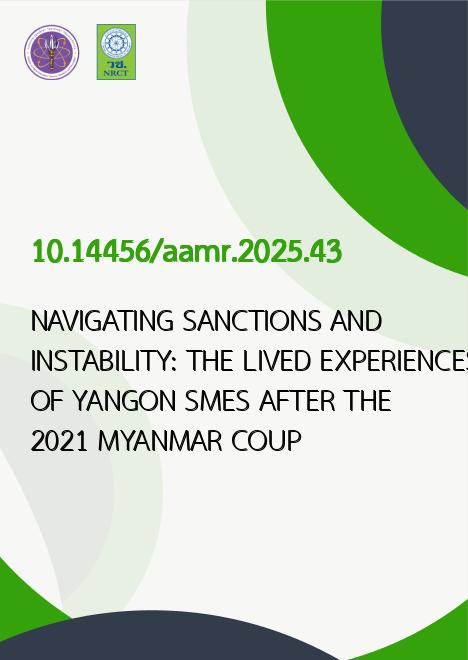
|
NAVIGATING SANCTIONS AND INSTABILITY: THE LIVED EXPERIENCES OF YANGON SMES AFTER THE 2021 MYANMAR COUP |
|---|---|
| รหัสดีโอไอ | |
| Creator | Nay Lin HTUN |
| Title | NAVIGATING SANCTIONS AND INSTABILITY: THE LIVED EXPERIENCES OF YANGON SMES AFTER THE 2021 MYANMAR COUP |
| Contributor | Sasiphattra SIRIWATO |
| Publisher | Asian Administration and Management Review |
| Publication Year | 2568 |
| Journal Title | Asian Administration and Management Review |
| Journal Vol. | 8 |
| Journal No. | 2 |
| Page no. | Article 18 |
| Keyword | Economic Sanctions, Myanmar, Small and Medium Enterprises, Yangon, Political Economy |
| URL Website | https://so01.tci-thaijo.org/index.php/AAMR |
| Website title | https://so01.tci-thaijo.org/index.php/AAMR/article/view/281350 |
| ISSN | 2730-3683 |
| Abstract | This study examines the impact of post-coup economic sanctions on the daily realities of Small and Medium Enterprises (SMEs) in Yangon, Myanmar, a context characterized by international pressure and domestic political turmoil. Through qualitative interviews with seven Yangon SME owners and experts, the research explores the complex interplay of economic sanctions, government policies, and operational challenges. The study identifies key transactional constraints, including international financial restrictions, inflation, and supply chain disruptions. It finds that sanctions, while intended to pressure the regime, disproportionately impact SMEs and interact with domestic misgovernance, creating a compounding effect. The study examines how government policies, particularly those related to price and currency controls, exacerbate challenges faced by SMEs. Drawing parallels with the Iranian experience, the research underscores the significance of a state's response in mitigating the adverse effects of sanctions. The study proposes targeted financial support for SMEs and programs for displaced workers as crucial measures to foster resilience and prevent further economic decline. Ultimately, this research contributes to understanding the human impact of sanctions in fragile states and informs strategies for more effective and responsible foreign policy. |